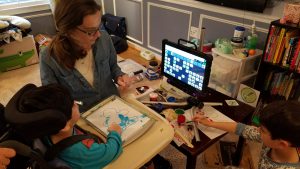 As we roll Joey’s chair closer to his eye gaze AAC device, Joey’s eyes light up as though he is reuniting with an old friend. Once we position him in front of his screen, and make sure he is close enough so that the sensor can pick up his eye gaze, he’s off to the races. Some days he dives into his words right away. Helicopter. Purple. Car. Fast. Tyrannosaurus Rex. Tiger. Parrot. Penguin. Where. Alligator. Purple. White. Over. The words come out fast and furious – there are so many words and so much time to make up for.
As we roll Joey’s chair closer to his eye gaze AAC device, Joey’s eyes light up as though he is reuniting with an old friend. Once we position him in front of his screen, and make sure he is close enough so that the sensor can pick up his eye gaze, he’s off to the races. Some days he dives into his words right away. Helicopter. Purple. Car. Fast. Tyrannosaurus Rex. Tiger. Parrot. Penguin. Where. Alligator. Purple. White. Over. The words come out fast and furious – there are so many words and so much time to make up for.
I imagine those first moments of re-connecting with his device is a lot like coming home to your house after vacation. You just need to make sure everything is where you left it so you know it is there when you are ready to use it.
In these moments of rapid word sprees, it is hard to know if Joey is just checking to see if the words are still there, or if he is trying to make up for lost time and tell us about a dinosaur, a car, a helicopter or something fast that he experienced when he wasn’t near his talky. One of the frustrating pieces of Joey’s eye gaze device is that it is stationary. He is too young to have it strapped to his wheelchair (it could cause the chair to tip over), and it isn’t feasible to have on the floor where he plays. He must be strapped into his chair, sitting at a table in order to access his digital words. Table top activities is not where three-year olds spend most of their day, so Joey spends long periods of time away from his words. It’s not ideal, and there are some low-tech options for him, and the family makes it work. It makes reuniting with his device that much sweeter each day.
There are moments I find myself impatient or frustrated with the strings of words– this was not the plan for today. I had a book to read to him, an activity to do, a song to sing. Yet he’s talking about dinosaurs, or owls, or fast helicopters. But then I remember that these are his words. Words he doesn’t get to see often. If you only gave me access to my words for a few hours a day, I’d be exploding to talk as well. I wouldn’t want to stay on your topic either, because this would be my one opportunity to share my thoughts and observations of my past silent period. After all, my sessions with Joey are not about me and my great plans. They are about supporting Joey’s growth and development. His relationship with his words should be far stronger than anything I bring to the table.
After a bit, he settles down. He is either reassured that his words are all where he left them, or that his stories have been told. He goes back to our activities, and uses his device to tell me about what we are doing (or to let me know he hears a helicopter up above.)


